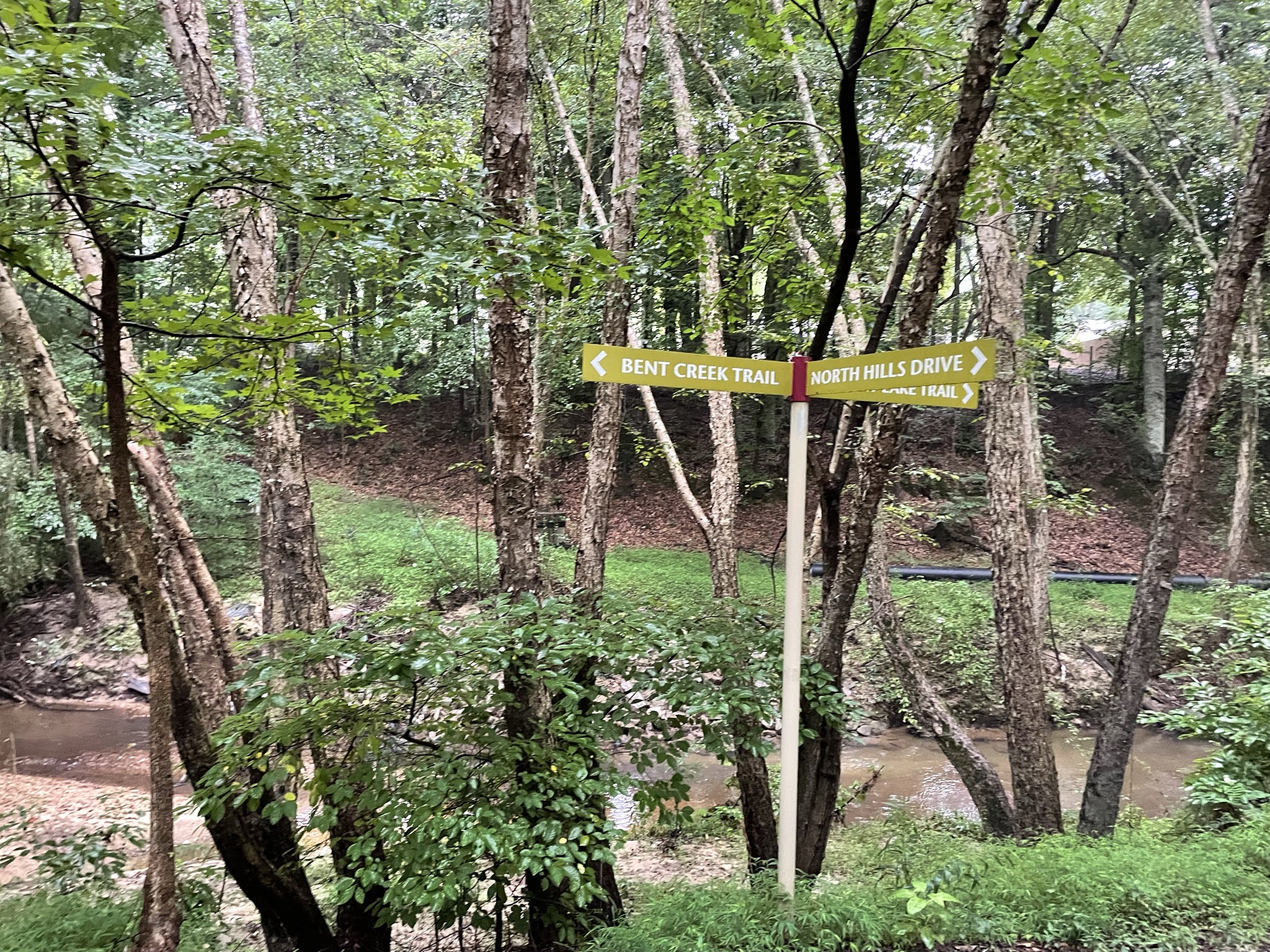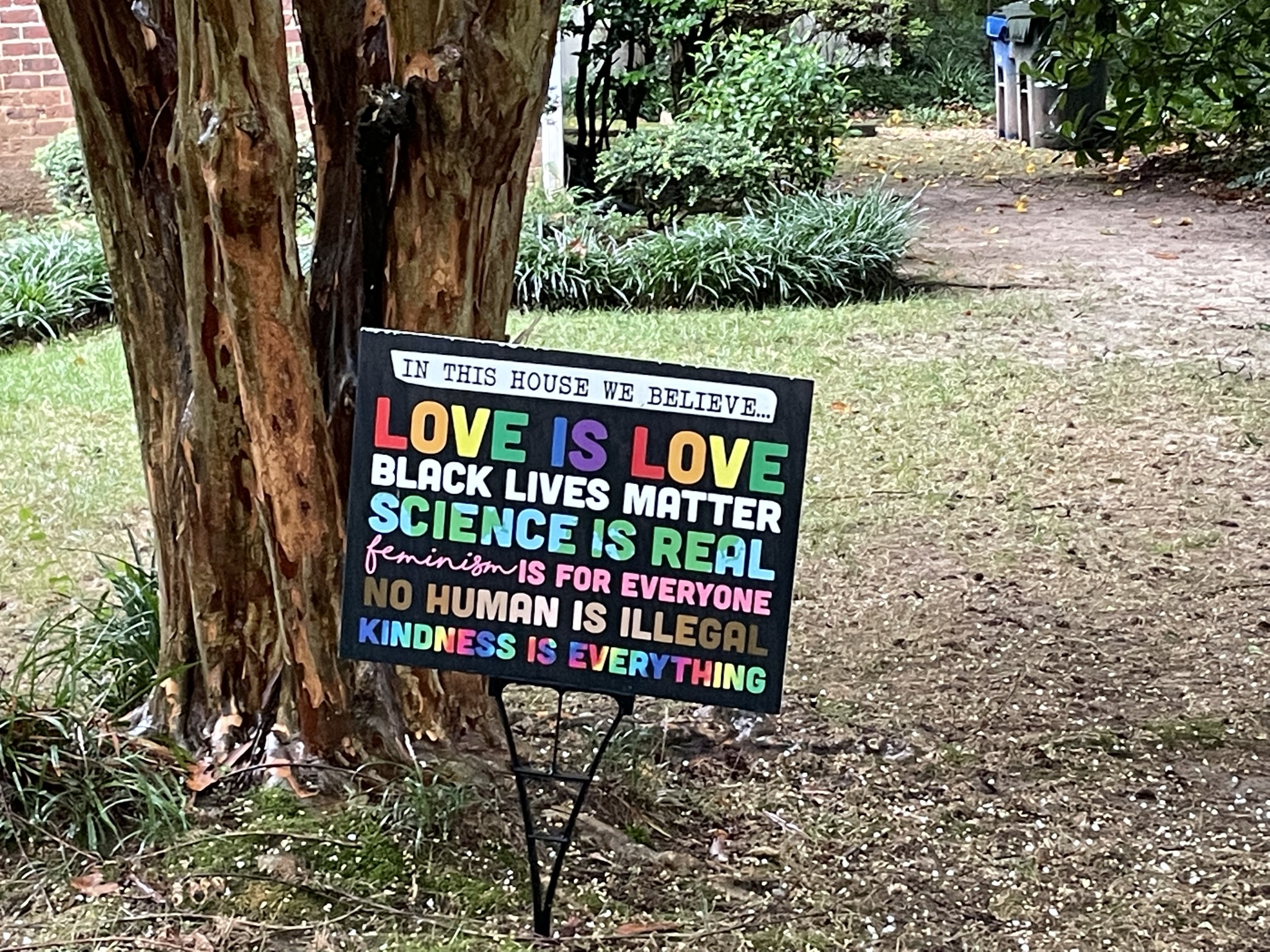Forat asked to watch a movie about a couple arrested for violating a ban on interracial marriage. I wondered what she understood about our family.
Falafel in the South
“Hada humus!” Adam insisted. “That’s humus!” I was surprised to hear him speak Arabic, a language he abandoned in favor of English six weeks after our arrival in North Carolina for a sabbatical year. Only in bed sometimes, early in the morning, he speaks Arabic with his father, Osama, before he fully awakes and remembers where he is.
“No, habibi, I’m making falafel,” Osama said, pointing to the chickpeas in the food processor. At home, in the Ramallah area, I would buy falafel on weekends on my way back from a morning run, delighting the children with the brown paper bag filled with hot falafel balls. We hadn’t eaten falafel since arriving in Raleigh, and Adam seemed to have forgotten what it is.
His seven-year old sister Forat decided to explain: “Adam!” she screamed at him, her face close to his, “Falafel!” Adam stared at her, insulted, took a step backward, declared, “Humus!” and escaped to the children’s room to build a lego tower.
“At least he didn’t slam the door,” Osama said, comparing Adam’s three-year old anger with that of Forat. Lately, Forat has taken on behaviors characteristic of adolescents: teenage-level rage that explodes if we make a mistake in preparing her sandwich, proclamations that no one loves her and expressions of a deep wish to exchange her family members with improved versions. That child is growing up.
“Ima, can we watch the movie about the people who weren’t allowed to get married?” Forat asked. She must have remembered the conversation we had driving through Virginia, about Mildred and Richard Loving, a Black woman and white man who fell in love in the 1950’s in Caroline County, Virginia. Policemen broke into their bedroom and arrested them for violating a law in force at that time in all states in the Southern United States, outlawing marriage between Blacks and whites. The couple launched a legal battle that ultimately invalidated those laws.
“That’s not a movie for children,” Osama said.
“Pleaaaaaaase, Ima!” Forat begged.
Meanwhile, the smell of falafel had filled the apartment. Adam came out of his room, searching for its source, and stared at the balls frying in the pan.
“Falafel!” he yelled, smiling in recognition, and Osama, Forat and I burst into laughter.
The Loving Family’s Love
In the evening, we sat on the couch and watched the movie Forat had requested, “Loving.” The couple fled to Washington, D.C. to escape prison, but they snuck back into Virginia toward the end of Mildred’s pregnancy so that Mildred could give birth close to her family, aided by her mother-in-law, who was a midwife. The white mother midwifed her Black daughter-in-law gently and expertly. But in response to her son’s expression of thanks, she told him, “You should never have married her.”
The son was confused: “I thought you liked her,” he said.
The mother didn’t blink: “I like a lot of people. You should have known better.”

![]()
Forat was also confused. She asked me to pause the film. “I thought the mother liked Mildred,” she said.
“People aren’t usually entirely racist or entirely not racist,” I told Forat. “The mother liked Mildred but also thought that whites should marry whites.” I searched Forat’s face, trying to understand what she understood. One of the few things I conceal from her is the opposition that some members of my family members have to my relationship with Osama, a Palestinian refugee from a Muslim family that was forced out of Majdal, now part of the Israeli city of Ashkelon, in 1948. I was also confused to see that genuine affection for Osama did not change the racist views that some family members maintained about Arabs. The issue was even more confusing, because one relative – the one who told me that Arabs suckle hatred of Jews in their mother’s milk – was himself an Arab who had fled his native Iraq together with the rest of the Iraqi Jewish community. Over the years, he learned to accept Osama and our children, who, as far as I know, suckled protein, fat and antibodies from my breasts, not hatred. Although that relative treats Osama with kindness and respect, he continues to make racist statements about Arabs. I worried about the day when Forat would understand that and ask me questions.

I hoped our stay in the United States would open a window for Forat to realize that people evolve and are capable of change, also for the better. In North Carolina and throughout the Southern United States, there are attempts to grapple with the history of slavery and the present of racism. We see Black Lives Matter flags on our neighbors’ lawns, read about the civil rights movement in Forat’s textbooks and witness a lively public debate over school curricula that emphasize persistent structural racism in the United States.
Toward the end of the movie, the camera zoomed in on the white mother, now a grandmother, playing with her mixed grandchildren.
“Does she love the children?” Forat asked me.
“Everyone loves the children,” I told her, and that was true in our family as well.
This post was also published on haaretz.com on August 18, 2021:




شكرا ام فراط،
يعطيكي العافية.
לצערי פספסתי את המפגש , יש אפשרות לראות אותו . יש אפשרות לראות אותו מוקלט?
ירון (קורא אדוק)
תודה, ירון, על ההתעניינות והקריאה! לא הקלטתי אבל אני רוצה לארגן מפגשים נוספים וכשאעשה זאת אשלח לך מייל.
Excellent, just excellent. I hope your American family love Osama, and I have been concerned about whether your Jewish relatives harbour prejudice about your marrying a Palestinian.
Thank you, Tom!
How much better the world would be if the race, religion and ethnicity of the person someone love’s isn’t important.
Yes! Thank you.
לצערי הרב הפסדתי כמעט חצי מפגש כי נתקלתי בבעיה עם הכניסה לזום באמצעות גוגל. מקווה מאוד שתהייה הזדמנות נוספת למפגש דומה.
התרגשתי מהבלוג הנוכחי ומתפעלת מבגרותה של פורת בת השבע, בידיעה שלפניה עוד אתגרים לא פשוטים.
כן ירבו אנשים כמוכם.
שלום מרים,
תודה רבה על ההתעניינות! אני מתכוונת לארגן מפגשים נוספים בקרוב ואעדכן.
שרי
שרי יקרה, (אפשר ״יקרה״?)
בלוג מלא רגישות, אהבה וגם תחושות של “א קרעכצ…״ – אנחה של כאב לב.
הזכרת לי נשכחות. אני גר בשבדיה והייתי נשויי שלושים וחמש שנים לשבדית ״כשרה״ זכור לי איך אמא שלי ״ישבה עלי שבעה״ כשעברתי לגור בשבדיה. רוב המחיצות הרגשיות של הורי ושל עוד בני משפחה מול אשתי נפלו כשבאתי לארץ עם בני הבכור, הנכד הראשון של הורי.
לדאבון הלב ובצער עמוק אומר לך שאינני מאמין שתוכלו למצוא את חלקת אלוהים הקטנה שלכם במזה״ת ומשם להתערות בחברה בה תחיו, ישראלית או פלסטינית. המקום הזה מלא ברעל של שנאה, גזענות, צרות עין ובורות.
גדלו את ילדיכם הנפלאים להיות אזרחי העולם עם לב פתוח וסובלני, אנושיות וכבוד כלפי כל אדם. הרבה יותר אין צורך!
אפשר באמת לכתוב הרבה ספרים בנושא (את כתבת אחד, בינתיים) בלי יכולת למצותו, אז אסתפק במילים קצרות אלו.
שמחתי להשתתף בשיחה שקיימת לפני כמה ימים. הייתי שמח יותר לשוחח פנים אל פנים.
הספר נמצא בדרך אלי מישראל ואני מלא ציפיות.
אני מצרף את קולי לכל אלו שמלווים אותכם בדאגה, בחיבה ובאהבה ומקווים שתצלח דרככם!
יהודה
שלום יהודה,
ברור שאני מקבלת בתודה את ה”יקרה”!!! ותודה גם על השתתפותך במפגש והתעניינותך בספר. אני שמחה שהוריך היו מספיק נבונים לדאוג שלא יפסידו את הנכדים שלהם. גם הוריי.
ילדיי בלית ברירה יהיו אזרחי העולם אבל אם נצליח להתמודד עם הלחצים של ישראל-פלסטין – אשמח להישאר. יש שם הרבה עבודה שצריך לעשות אותה.
תודה על המילים החמות!
שרי
שרי יקירה,
גם עשית לי חשק עז לפלאפל (לא רלוונטי בשתיים וחצי אחרי חצות..) וגם עוררת את געגועי .
איזה יופי את כותבת. איך את מוציאה מכל רגע לקח מקסים ואיך את מחברת לבבות אנונימיים ברחבי העולם סביב המלים שלך.
חיבוק חם לכולכם.
קיקי
תודה לך, קיקי! הפלאפל עלינו בביקור שלך אצלנו, כשנחזור 🙂
היכולת שלך לכתיבה היא מדהימה אני אוהבת מאד
מצאתי אתר לספרים שיעשו את ההבדל אולי את כבר מכירה לינק –
https://www.amightygirl.com/
כן גם לי בא פלאפל אז אין לי חשק לחכות עד שאכין ואין לי עיסה מוכה אז כן בדרום יש פלאפל הכי טוב כאן.
בתוך הסופרמרקט Al Madina Halal Market & Restaurant
אז עכשיו צהריים אני יוצאת לקנות פלאפל.
תודה על השיתוף שלך.
תודה רבה, רותי! ותודה על הקישור לאתר – אבדוק. שיהיה לך בתיאבון.
תודה שרי.
כרגיל כתיבתך חמה ומעודדת.
תודה, רם!
Curiosity …a bit late.
Is the sign in the picture that accompanies this article on your front lawn, or just something that caught your eye ?
Either way, its a nice way to say a lot.
p.s. The Tooth Fairy is real.